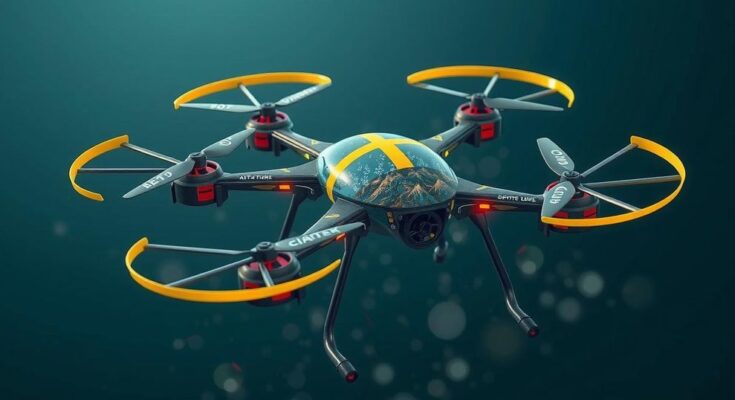The Combat Climate Change (C-3) UAV Project, a collaboration between Sweden and Colombia, has been launched to enhance climate research using unmanned aerial vehicles. Officials from both nations, alongside academic and industry partners, have developed a UAV equipped with sensors to measure greenhouse gases and monitor ecosystems. This initiative aims to complement satellite data and improve predictions related to climate change. The project reflects a shared commitment to innovation for environmental preservation and fulfills a vital need for scientific engagement in addressing climate challenges.
In a significant endeavor to combat climate change, distinguished representatives from Sweden and Colombia have announced the launch of the Combat Climate Change (C-3) UAV Project. This initiative, which features the collaboration of the Minister for Climate and the Environment of Sweden, the Minister of Science of Colombia, Saab, EAFIT University, and KTH Royal Institute of Technology, aims to enhance climate-related research through the use of advanced unmanned aerial vehicles (UAVs). The ambitious project was inaugurated during COP16 by prominent figures including Romina Pourmokhtari of Sweden, Yesenia Olaya of Colombia, Eva Axelsson representing Saab, and Olga Lucía Quintero, project supervisor from EAFIT. This collaboration symbolizes the strong partnership between Colombia and Sweden, emphasizing their mutual commitment to leveraging technological innovation for environmental conservation and monitoring. The newly developed UAV will feature specialized sensors designed to measure concentrations of greenhouse gases such as carbon dioxide and methane, in addition to monitoring various atmospheric pollutants and aerosols. Moreover, the UAV will play a crucial role in assessing the vitality of ecosystems including the Amazon rainforest and agricultural lands by identifying shifts in vegetation and soil conditions. Through the integration of aerial imagery with data collected on the ground, the project aims to complement existing satellite information, thereby enriching understanding of the intricate global climate system. The data garnered will be utilized within extensive mathematical and AI-driven models to enhance climate prediction and mitigation efforts. This strategic initiative aligns with the priorities set by President Petro’s administration in Colombia, underscoring the importance of scientific and technological interventions in addressing climate challenges. Yesenia Olaya highlighted, “Contributing to mitigating climate change is one of the priorities of President Petro’s government… monitoring biodiversity and climate change will help us anticipate and find solutions from science, technology and innovation to the challenges that this poses.” Moreover, Eva Axelsson from Saab emphasized their role in fostering academic collaboration and advancing the Triple Helix model, which promotes cooperative engagement between scientific, societal, and market stakeholders to counter climate change. Since February 2023, a dedicated team of research engineers from KTH Royal Institute of Technology and EAFIT University has been tirelessly collaborating to design and construct the UAV. Through this multinational effort, the project serves as a vital platform for academic exchange within an international framework.
The Combat Climate Change (C-3) UAV Project emerges at a critical time as global climate change poses severe threats to ecosystems, biodiversity, and human livelihoods. Recognition of these dangers has spurred nations to seek innovative solutions that harness technology for environmental monitoring and protection. The partnership between Sweden and Colombia reflects a broader trend of international collaboration aimed at tackling climate challenges through scientific innovation. The involvement of prestigious institutions and commercial entities such as EAFIT University, KTH Royal Institute of Technology, and Saab further underscores the commitment to applying advanced technologies like UAVs in climate research.
The Combat Climate Change (C-3) UAV Project stands as a testament to the powerful collaboration between Colombia and Sweden in the field of climate research. By harnessing UAV technology equipped with advanced sensors, this initiative promises to generate valuable data that will enrich our understanding of climate dynamics and support efforts in mitigation and adaptation. The project not only signifies progress in scientific cooperation but also highlights the necessity of innovative solutions in confronting the climate crisis that affects all of humanity.
Original Source: www.saab.com




